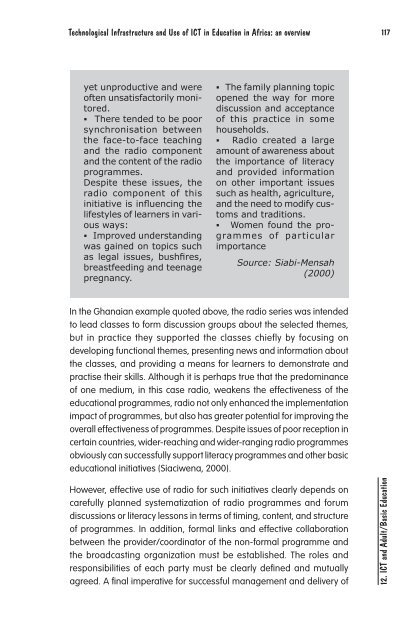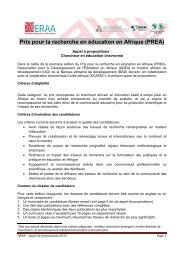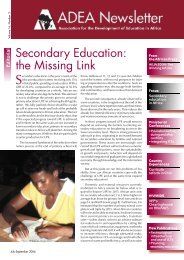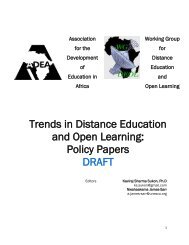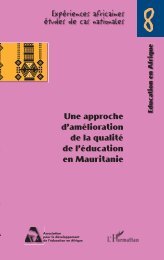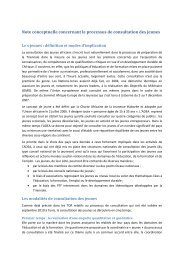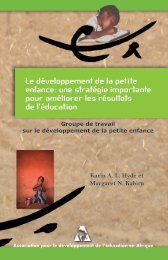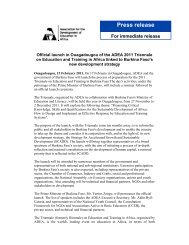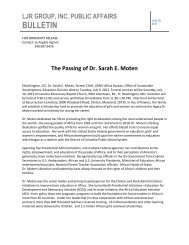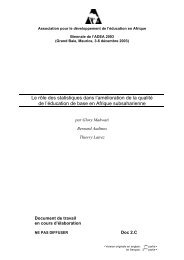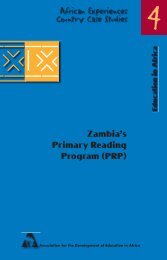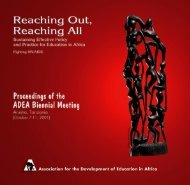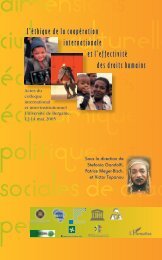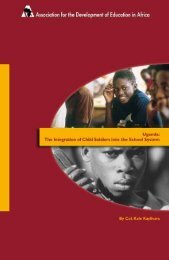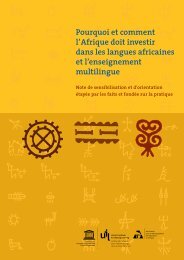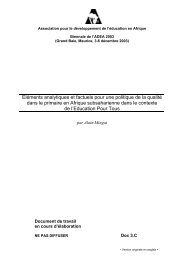Technological Infrastructure and Use of ICT in Education in ... - ADEA
Technological Infrastructure and Use of ICT in Education in ... - ADEA
Technological Infrastructure and Use of ICT in Education in ... - ADEA
Create successful ePaper yourself
Turn your PDF publications into a flip-book with our unique Google optimized e-Paper software.
<strong>Technological</strong> <strong>Infrastructure</strong> <strong>and</strong> <strong>Use</strong> <strong>of</strong> <strong>ICT</strong> <strong>in</strong> <strong>Education</strong> <strong>in</strong> Africa: an overview<br />
117<br />
yet unproductive <strong>and</strong> were<br />
<strong>of</strong>ten unsatisfactorily monitored.<br />
• There tended to be poor<br />
synchronisation between<br />
the face-to-face teach<strong>in</strong>g<br />
<strong>and</strong> the radio component<br />
<strong>and</strong> the content <strong>of</strong> the radio<br />
programmes.<br />
Despite these issues, the<br />
radio component <strong>of</strong> this<br />
<strong>in</strong>itiative is <strong>in</strong>fluenc<strong>in</strong>g the<br />
lifestyles <strong>of</strong> learners <strong>in</strong> various<br />
ways:<br />
• Improved underst<strong>and</strong><strong>in</strong>g<br />
was ga<strong>in</strong>ed on topics such<br />
as legal issues, bushfires,<br />
breastfeed<strong>in</strong>g <strong>and</strong> teenage<br />
pregnancy.<br />
• The family plann<strong>in</strong>g topic<br />
opened the way for more<br />
discussion <strong>and</strong> acceptance<br />
<strong>of</strong> this practice <strong>in</strong> some<br />
households.<br />
• Radio created a large<br />
amount <strong>of</strong> awareness about<br />
the importance <strong>of</strong> literacy<br />
<strong>and</strong> provided <strong>in</strong>formation<br />
on other important issues<br />
such as health, agriculture,<br />
<strong>and</strong> the need to modify customs<br />
<strong>and</strong> traditions.<br />
• Women found the programmes<br />
<strong>of</strong> particular<br />
importance<br />
Source: Siabi-Mensah<br />
(2000)<br />
In the Ghanaian example quoted above, the radio series was <strong>in</strong>tended<br />
to lead classes to form discussion groups about the selected themes,<br />
but <strong>in</strong> practice they supported the classes chiefly by focus<strong>in</strong>g on<br />
develop<strong>in</strong>g functional themes, present<strong>in</strong>g news <strong>and</strong> <strong>in</strong>formation about<br />
the classes, <strong>and</strong> provid<strong>in</strong>g a means for learners to demonstrate <strong>and</strong><br />
practise their skills. Although it is perhaps true that the predom<strong>in</strong>ance<br />
<strong>of</strong> one medium, <strong>in</strong> this case radio, weakens the effectiveness <strong>of</strong> the<br />
educational programmes, radio not only enhanced the implementation<br />
impact <strong>of</strong> programmes, but also has greater potential for improv<strong>in</strong>g the<br />
overall effectiveness <strong>of</strong> programmes. Despite issues <strong>of</strong> poor reception <strong>in</strong><br />
certa<strong>in</strong> countries, wider-reach<strong>in</strong>g <strong>and</strong> wider-rang<strong>in</strong>g radio programmes<br />
obviously can successfully support literacy programmes <strong>and</strong> other basic<br />
educational <strong>in</strong>itiatives (Siaciwena, 2000).<br />
However, effective use <strong>of</strong> radio for such <strong>in</strong>itiatives clearly depends on<br />
carefully planned systematization <strong>of</strong> radio programmes <strong>and</strong> forum<br />
discussions or literacy lessons <strong>in</strong> terms <strong>of</strong> tim<strong>in</strong>g, content, <strong>and</strong> structure<br />
<strong>of</strong> programmes. In addition, formal l<strong>in</strong>ks <strong>and</strong> effective collaboration<br />
between the provider/coord<strong>in</strong>ator <strong>of</strong> the non-formal programme <strong>and</strong><br />
the broadcast<strong>in</strong>g organization must be established. The roles <strong>and</strong><br />
responsibilities <strong>of</strong> each party must be clearly def<strong>in</strong>ed <strong>and</strong> mutually<br />
agreed. A f<strong>in</strong>al imperative for successful management <strong>and</strong> delivery <strong>of</strong><br />
12. <strong>ICT</strong> <strong>and</strong> Adult/Basic <strong>Education</strong>


